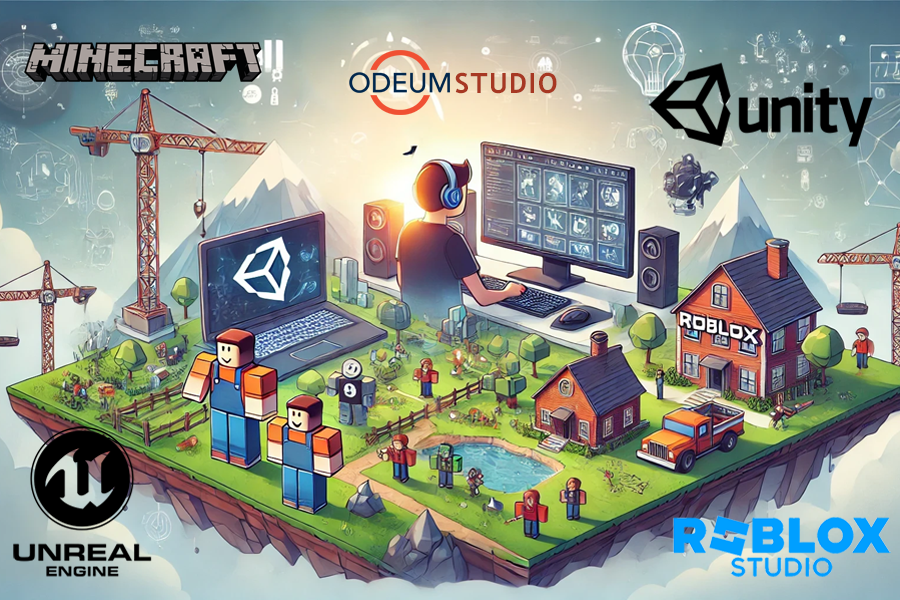Creating educational games that effectively engage learners and enhance their understanding is no small feat. With the rise of game-based learning, educators and developers alike are seeking tools that can help them craft games that are not only fun but also pedagogically sound. James Paul Gee, a prominent figure in educational theory, has outlined key principles of game-based learning that emphasize the importance of situated learning, immediate feedback, and active problem-solving. If you're looking to create a game that embodies these principles, you have a few powerful tools at your disposal. This article explores the best tools for creating educational games, examining three primary options: building from scratch with Unity or Unreal Engine, using a middle layer tool like Roblox Studio or Minecraft, and leveraging Odeum Studio, which has these principles baked in.
1. Creating from Scratch: Unity and Unreal Engine
Unity and Unreal Engine are two of the most powerful and versatile game development platforms available. Both engines offer incredible flexibility, allowing developers to build almost any type of game they can imagine, including educational games that adhere to James Paul Gee’s principles. However, with great power comes a steep learning curve.
Pros:
- Total Control: These engines provide complete control over every aspect of the game, from graphics to gameplay mechanics. This means you can fully customize the learning experience to align with specific educational goals.
- High-Quality Graphics: Unity and Unreal Engine are capable of producing stunning, realistic graphics, which can enhance the immersive experience—a key component of Gee’s situated learning principle.
- Large Community and Resources: Both platforms have extensive documentation, tutorials, and a large community of developers who can offer support and inspiration.
Cons:
- Complexity: Developing a game from scratch requires significant programming knowledge and technical expertise. For educators without a background in game development, this can be a daunting barrier to entry.
- Time-Consuming: Creating a fully functional game from the ground up can take months or even years, especially if you’re aiming for a polished, professional-quality product.
- Cost: While the basic versions of these engines are free, additional features and assets often come with a price tag. Moreover, the time and resources needed to learn these tools can add up.
If you have the time and money, Unity or Unreal Engine can be one of the best tools for creating educational games. However, most of us need a more user-friendly solution that allows for faster development.
2. Middle Layer Tools: Roblox Studio and Minecraft
For those looking for a balance between flexibility and ease of use, middle layer tools like Roblox Studio and Minecraft offer a compelling option. These platforms provide a more accessible way to create educational games, leveraging pre-existing frameworks and communities to help bring your ideas to life.
Pros:
- Ease of Use: Compared to Unity or Unreal Engine, Roblox Studio and Minecraft are much easier to learn. They come with built-in tools and assets that simplify the development process, allowing even those with limited technical skills to create engaging games.
- Community and Collaboration: These platforms have vast, active communities where educators can share their creations, collaborate, and draw inspiration from others. This aligns well with Gee’s principle of collaborative learning.
- Rapid Prototyping: Because these tools are designed to be user-friendly, you can quickly prototype and test your ideas, making iterative improvements based on feedback—crucial for creating games that provide immediate, formative feedback.
Cons:
- Limited Flexibility: While easier to use, these platforms are less flexible than building from scratch. You’ll be working within the constraints of the platform, which may limit how fully you can implement Gee’s principles.
- Less Professional Finish: While Roblox and Minecraft can produce engaging educational experiences, they often lack the polish and professionalism of games created with Unity or Unreal Engine.
- Platform Dependence: Games created on these platforms are typically tied to the platform itself, which can limit distribution and accessibility.
3. Odeum Studio: The Purpose-Built Solution
Odeum Studio is designed specifically for educators who want to create high-quality educational games without the steep learning curve of traditional game development tools. It’s a purpose-built platform that integrates James Paul Gee’s principles of game-based learning into its core, making it an ideal choice for creating educational games that are both effective and engaging.
Pros:
- Ease of Use: Odeum Studio is designed to be intuitive and user-friendly, allowing educators to create games without needing extensive technical expertise. The platform includes built-in templates and tools that guide you through the process of creating educational content that adheres to best practices in game-based learning.
- Educational Focus: Unlike general-purpose game engines or middle layer tools, Odeum Studio is specifically designed for educational games. This means that features like immediate feedback, situated learning environments, and scaffolded learning experiences are baked into the platform.
- Rapid Development: With Odeum Studio, you can create and deploy educational games much faster than with other tools. This allows you to focus on the content and pedagogy, rather than getting bogged down in technical details.
- Alignment with Educational Standards: Odeum Studio includes tools that help ensure your games align with educational standards, making it easier to integrate them into your curriculum.
Cons:
- Less Flexibility: While highly specialized, Odeum Studio may offer less flexibility than a fully customizable engine like Unity or Unreal. However, for most educational purposes, the trade-off is worth it.
- Niche Focus: As a tool specifically designed for educational games, Odeum Studio might not be the best fit for non-educational game projects.
Choosing the Right Tool for Your Educational Game
When it comes to creating educational games that adhere to James Paul Gee’s principles of game-based learning, the right tool depends on your goals, expertise, and resources. If you have the technical skills and time, creating from scratch with Unity or Unreal Engine offers unmatched flexibility and control. If you’re looking for a middle ground, platforms like Roblox Studio or Minecraft provide a good balance of accessibility and creative potential. However, if you want a tool that’s purpose-built for education, with the principles of game-based learning already integrated, Odeum Studio is the clear choice.
At Odeum, we’re passionate about empowering educators to create meaningful, engaging learning experiences through game-based learning. Whether you’re an experienced developer or an educator new to game design, Odeum Studio is one of the best tools for creating educational games by making it easy to create educational games that inspire and educate. Explore Odeum Studio today and discover how easy it can be to bring your educational game ideas to life.



